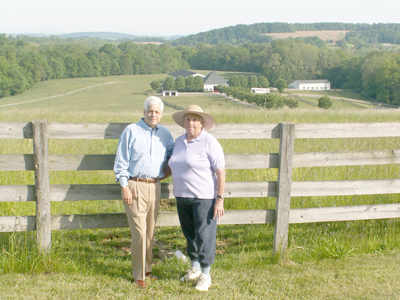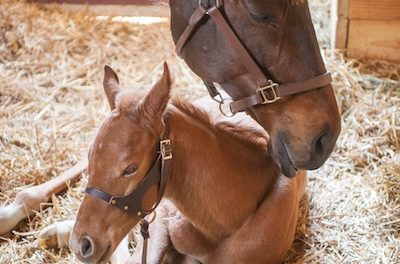
“MET was a natural partner for us because they shared our vision for the farm.” – Steve and Suzanne Quarles, Some Day Soon Farm
by Adam Block, MET Conservation Easement Planner (published in the November 2010 Equiery)
Some Day Could Be Sooner Than You Think!
The scenic rolling pastures of Some Day Soon Farm are protected forever thanks to a conservation easement donated by Steve and Suzanne Quarles to the Maryland Environmental Trust (MET). A 247-acre Hanoverian breeding station between Mt Airy and New Market in Frederick County, Some Day Soon includes a 33-stall barn, breeding barn, and indoor riding arena. The easement permanently protects 7,000 linear feet of the Woodville Branch stream bed, 5,000 feet of scenic road frontage, and habitat for forest interior-dwelling birds.Steve and Suzanne Quarles worked with MET to customize a conservation easement that protects the conservation values of the property while also permitting horse farm-related activities, including both their current activities (breeding and raising horses) and other possible future activities (boarding, training and riding lessons); and the construction of a limited amount of housing for farm tenants. The easement also provides that the Audubon Society of Central Maryland, Inc., or another similar nonprofit environmental organization, may manage the forest and riparian portions of the property in the future for passive recreation, including the construction and use of permeable foot and horse trails.
“MET was a natural partner for us because they shared our vision for the farm,” Suzanne Quarles explains. “We found the staff to be professional, highly competent and diligent in crafting an easement that met our needs and will ensure the future viability of our property as a horse farm.”
The Maryland Environmental Trust
MET is a statewide land conservation organization created by the Maryland General Assembly in 1967. Over the past 40+ years, MET has become one of the most successful land trusts in the country, having protected over 125,000 acres on more than 1,000 properties. Hundreds of landowners have worked with MET to protect their properties from development, preserve land for farming, forestry and equestrian uses, and realize a number of tax benefits.
Horses Connect
MET relies on partnerships with local and regional land trusts, watershed groups, and hunt clubs in order to reach landowners. MET has long since recognized the natural connections that equestrians have to land conservation. The organization’s success in many parts of the state, most notably in Baltimore and Harford counties, is inextricably linked to the direct involvement of foxhunters, steeplechase riders, and dressage enthusiasts in conservation activities. Over time, MET has revised its model deed of conservation easement to appeal to these landowners. Today, the conservation easement expressly permits equestrian sports, events, shows, boarding, training and recreational or therapeutic riding opportunities on protected properties.
Sycamore Hall’s New Life as Riveredge
Other recent successes include the protection of Riveredge, a 532-acre horse farm in Cecil County owned by Leslie and John Malone. Previously known as Sycamore Hall when it was a Thoroughbred breeding farm, the property was slated to be developed into 58 house lots. New owners purchased the property in 2007 and shelved the development plan, instead deciding to permanently protect the land with a conservation easement and restore it to its former grandeur as a notable equestrian destination. The easement was donated to MET and the Eastern Shore Land Conservancy (ESLC), one of the state’s most active local land trusts. Land trusts are not-for-profit corporations designed to protect land from development, using conservation easements, gifts or purchases of land, limited development, conservation buyers, or promotion of existing local, state, or federal easement programs. Since the early 1990s MET has worked to build the capacity of local land trusts so that they can be successful in their communities. Today, MET works hand in hand with its land trust partners to solicit, hold, and steward its conservation easements.
The Riveredge easement permanently protects habitat for forest interior-dwelling birds and water quality along tributaries of Back Creek, a Chesapeake Bay tributary. Riveredge is situated just south of Chesapeake City on the east side of the Cayots Corner Preservation Area, which is the Maryland Agricultural Land Preservation Foundation’s largest block of protected land on the Eastern Shore. The permanent preservation of Riveredge brings the total acreage of the protected block to over 5,000 acres. The farm itself is now home to Hassler Dressage.
“Protection of Riveredge is a real victory for the community,” said Sandra Edwards, ESLC’s Land Protection Specialist. “Horse farms are an important icon in this area and as we watch the number of working horse farms dwindle, it is very gratifying to see such a beautiful symbol of that industry protected forever from development.”
In addition to these large operations, MET has also worked with hundreds of smaller property owners to preserve valuable natural resources, halt development, and help maintain equestrian uses such as boarding and trail riding.
What is a Conservation Easement?
A conservation easement is a legal agreement between a landowner and a land trust (such as MET), which restricts the future uses of the landowner’s property. It applies to all future owners of the property and limits such things as subdivision and residential development. It does not grant public access to a property unless that is what the landowner wants. Each conservation easement is tailored to fit a landowner’s vision and goals for his or her property. A donation of a conservation easement offers the following long-term benefits:
• Permanent protection of natural areas, farm and forest lands and historic property;
• Potential federal and state income tax deductions for the appraised value of the easement as a charitable gift;
• Lower estate and inheritance taxes reflecting the reduced development potential of the property;
• Prompt processing of easement agreements (typically within three to four months of the offer);
• A 15-year state and local property tax exemption on the unimproved land.
©TheEquiery2010










